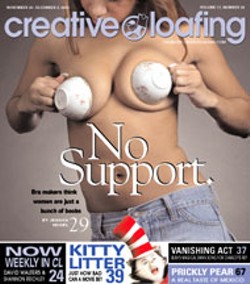Adopting An Attitude
James wants gay adoption case investigated
What's more, the conflict that launched the battle stands poised to rival the infamous Stratton case for sheer strangeness in a year when the county's Department of Social Services (DSS) just can't seem to stay out of the news.
The whole thing started back in June 2001, when a crack-addicted woman checked herself into Carolinas Medical Center under a fake name -- there were warrants out for her arrest -- and bore two underweight twins in serious need of medical attention. When the babies' aunt, Rebecca Lawrence, learned of their birth, she informed Susan Esbenshade and her husband of the birth, because, Lawrence says, the babies' mother told her that she wanted them to be adopted by the Esbenshades, who already had custody of a half-sister.
The Esbenshades claim they then blew the crack-mother's cover by ratting her out to DSS, out of concern, they say, that the hospital would send the babies home with their mother. They hoped they'd eventually be able to adopt them, they say. Then the story gets murkier. The Esbenshades, who live in Asheville, say they were given evasive answers by social workers they contacted about obtaining custody of the children. They say they were told by county social workers that they could not adopt the children and were not allowed to see them in the hospital.
Meanwhile, the gay couple, who spent months with the children in the hospital as they fought the effects of a premature birth and their mother's drug addiction, say they were told by social workers that the Esbenshades didn't want to adopt the children because the babies had health problems. At the time, the Esbenshades say they couldn't get straight answers out of social workers about who was caring for the children.
By February 2002, Esbenshade says she and her husband decided to halt their efforts to adopt the children because a caseworker advised them that the children were in a wonderful foster home with great parents.
"We were told that both parents had medical backgrounds and in fact that she was a doctor," said Esbenshade.
As it turns out, she was a he and when the Esbenshades found out the couple was gay, they tried to intervene legally to stop the twins' adoption because, they say, they don't think placing them in the care of two gay fathers is morally appropriate.
One of the fathers tells a somewhat different story. Social workers assured him that the Esbenshades didn't want the children because of their health problems, a fact, he says, that was well documented during legal proceedings that surrounded the case. He has documentation of this in his possession, he says, but was unwilling or unable to dig it out of storage when CL requested copies of it last week. The Esbenshades, who were equally unresponsive to our request for written documentation to back up their claims, never bothered to visit the children in the hospital, missed crucial court dates, and generally showed little interest in the twins until they found out that the couple seeking to adopt them was gay, the twins' adoptive father says. Then they suddenly wanted to rip the kids from the only home they'd ever known. The two men eventually were able to adopt the children.
Exactly what happened here will probably never be known because, like the Stratton case, the case file is not open to the public. Lawrence, the children's aunt, says that county social workers didn't play it straight with her either, and from the beginning, when she couldn't get answers to her questions about the twins, she sensed something was wrong.
The twins' mother has since given birth to another child who the Esbenshades have obtained custody of. Lawrence said that this time the baby's mother purposely gave birth in Watauga County to avoid dealing with Mecklenburg County Youth and Family Services.
While Lawrence and other family members of the birth mother are firmly in the Esbenshades' camp, Ruth Shapack, the guardian ad litem for the twins who represented their interests in court, takes the side of the male couple. She says the two men are excellent fathers and that she's never seen children as well cared for. Shapack says gay people can make great parents and that, like her, almost everyone involved in the case favored placing the twins with the two fathers.
"We were all on one side," she said referring to court and family services workers involved in the case. "They (the Ebenshades) were on the other side."
Whatever the case, the only member of local government eager to discuss the issue with Creative Loafing was conservative Mecklenburg County Commissioner Bill James, a longtime critic of all things gay who, not surprisingly, has managed to plant himself smack in the middle of the whole thing.
He has demanded an investigation of the situation. And he's steamed, he said, because DSS personnel had assured him that adoptions to openly gay individuals were rare in this county and only occurred as a last resort for placing children.
At first, DSS and YFS dodged CL's questions about the state of gay adoption in Mecklenburg County. So did NC Attorney General Roy Cooper's office, which didn't respond to an email asking for legal clarity on the subject and has yet to respond to any of our questions dealing with gay issues this year. The county, it was explained to us at one point, follows state policy on the issue. That made sense until we learned from NC Department of Health and Human Services spokesperson Lois Nilsen that state policy is based on state law, which is silent on gay adoption. So therefore, there is no state policy per se on gay adoption, although state law certainly does not forbid it.
"Sexual orientation is not a consideration in the determination of fitness of an adoptive parent," Nilsen said.
There is no formal DSS policy regarding gay adoption in Mecklenburg County, said Suzanne Jeffries, a public information specialist with the county's Health and Human Services. DSS doesn't ask about sexual orientation or preferences when it grills prospective adoptive parents.
Since gay couples can't marry in North Carolina, and unmarried couples can't adopt jointly, only one member of a gay couple can legally adopt the children, even if both plan to raise them. But if a single person who wants to adopt children has a live-in partner, both must undergo background checks.
None of that addresses what happens when a couple like the one that adopted the twins is open about their sexuality, as they were during the adoption process.
According to Janet Mason, Professor of Public Law at the School of Government at UNC-Chapel Hill, a section of the State Social Services manual on licensing foster parents reads: "Regarding "nontraditional' family foster homes, the division of social services has no policy that disqualifies any family from consideration based solely on their marital status or sexual preference."
That gives departments of social services across the state wide latitude in how they judge whether the sexual orientation of a potential adoptive parent is a detriment to the child, she says.
"There is huge discretion in making the decision about any particular child because you have to weigh these hundred factors about is this the right place for this child," she said.
That subjects children and the gay couples that want to adopt them to two potential legal extremes. Because the law is vague, prospective gay parents could face discrimination at the whim of administrators in the adoption process in some places while gay adoption is quietly implemented by administrators in others.
Mason did manage to dig up one reference to the subject in a 1991 Attorney General's guidance letter that reads, "From a social work perspective, prohibiting licensing of "nontraditional' families is totally irrational in that your sexual orientation per se has no relation to your ability to parent a child or necessarily represent the best interest of the child."
"That's the only place I find where it's even been acknowledged that there are non-traditional families, much less what you do about them," Mason said.
Mason said it would likely be illegal for a board of county commissioners to set their own policy about gay adoption, but that if the state legislature set out to clarify the issue, a real legal battle could ensue.
That appears to be what James wants. If conservative rural Democrats and Republicans knew that gay adoption was being encouraged in parts of the state, he says, "The state legislature would come unglued."
Or perhaps the opposite would happen and they'd follow the lead of state and local social services agencies who prefer not to take a stand on the politically charged issue one way or the other -- or, it seems, to discuss it at all.
Contact Tara Servatius at tara.servatius@cln.com
Latest in Cover
Calendar
-

Wine & Paint @ Blackfinn Ameripub- Ballantyne
-

Face to Face Foundation Gala @ The Revelry North End
-
An Evening With Phil Rosenthal Of "Somebody Feed Phil" @ Knight Theater
-
Kountry Wayne: The King Of Hearts Tour @ Ovens Auditorium
-

Queen Charlotte Fair @ Route 29 Pavilion
-
Esports in Charlotte Takes Off: A Guide to Virtual Competitions and Betting
-
Canuck in the Queen City 7
A Canadian transplant looks back at her first year as a Charlotte resident
-
Lewis family launches Twelve In Twelve 1
The nonprofit hopes to raise money for 12 organizations around the world and encourage 'voluntourism'












